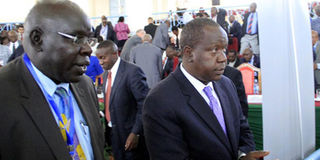Varsity reforms team suspends all executive master's degrees

Commission for University Education CEO David Some (left) and Education Cabinet Secretary Fred Matiang'i attend a conference on higher education at Kenyatta University on August 22, 2016. The commission wants universities offering executive master courses to prove they meet the standards within six months. PHOTO | DIANA NGILA | NATION MEDIA GROUP
What you need to know:
- Universities have also been directed to recall honorary degrees which violated standards, as well as degrees that fraudulently awarded.
- The CUE will work with universities to introduce quality part-time studies that provide research and greater contact between learners and their lecturers.
All executive master’s degree courses in universities have been suspended.
Holders of such degrees will also not be admitted for doctorates of philosophy, the Commission for University Education has said.
In a raft of measures announced today following an audit of public and private universities, the commission said executive master’s degree holders will not be allowed to teach in universities.
However, students will be allowed to complete their studies provided they had meet postgraduate admission criteria.
Universities offering executive master courses must prove they meet the standards within six months.
Universities have also been directed to recall honorary degrees which violated standards, as well as degrees that fraudulently awarded.
Future honorary degrees will be awarded with the guidance of commission.
Out of 27 universities that awarded honorary degrees, only nine complied with universities’ standards and guidelines.
Only 29 out 70 universities have developed policies for awarding of honorary degrees.
“The minimum standard on executive master’s degrees is offered to applicants holding management positions in industry and employment. They must also meet minimum entry requirements for a master’s degree,” notes the report.
The report was released at Kenya Institute of Curriculum development in an event presided over by Education Cabinet Secretary Fred Matiang’i.
DIRTY GAME
The audit established that executive degrees had been abused so much that one university had gone the whole hog and started an executive bachelor’s degree.
The audit also revealed that the quality of courses offered by many universities over the school holidays was wanting.
“They do not afford adequate contact time between the learners and their lecturers. They do not give learners sufficient exposure to quality degree research, library time and interaction between the learners themselves,” added the report.
The Commission for University Education will work with universities to introduce quality part-time studies that provide research and greater contact between learners and their lecturers.
The report revealed how students have been enrolling to pursue degrees with a D+ and graduating without supervisors’ approval, or an external examiners’ verdict.
Master’s degree holders have also been teaching master’s and doctorate students.
The report revealed that some universities were flouting admission criteria with some students enrolling for undergraduate studies using pre-university qualifications, bridging courses, and P1 certificates for teachers.
These are not recognised in law. Universities were admitting students using yardsticks such as mature age and experience.
POOR PROGRESS
For one to be admitted for undergraduate study, they need a C+ in the Kenya Certificate of Secondary Education or its equivalent.
The report also noted that 80 per cent of undergraduates complete their studies in the set time frame, while about 20 per cent fail or drop out for varied reasons.
“Less than 50 per cent of students complete their master’s degree and less than 20 per cent complete their PhD studies,” said the report.
There was also delay in post-graduate progression.
“For example, a student took 11 years to graduate with PhD. Others took between nine and 14 years to attain a master’s degree,” added the report.
Even though universities have elaborate examinations policies, the report notes that internal moderation was lax in some universities, leading to sub-standard examinations.




